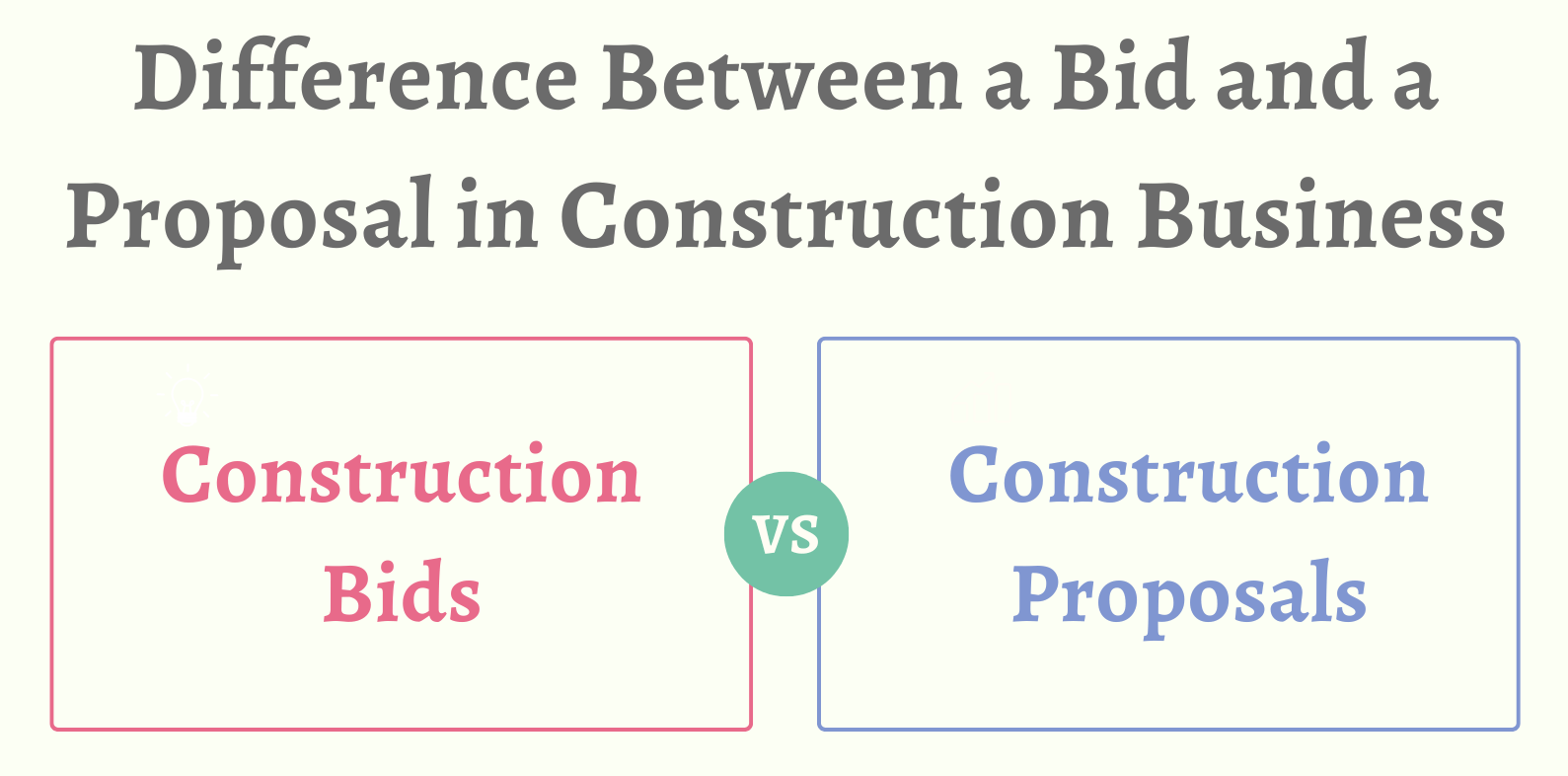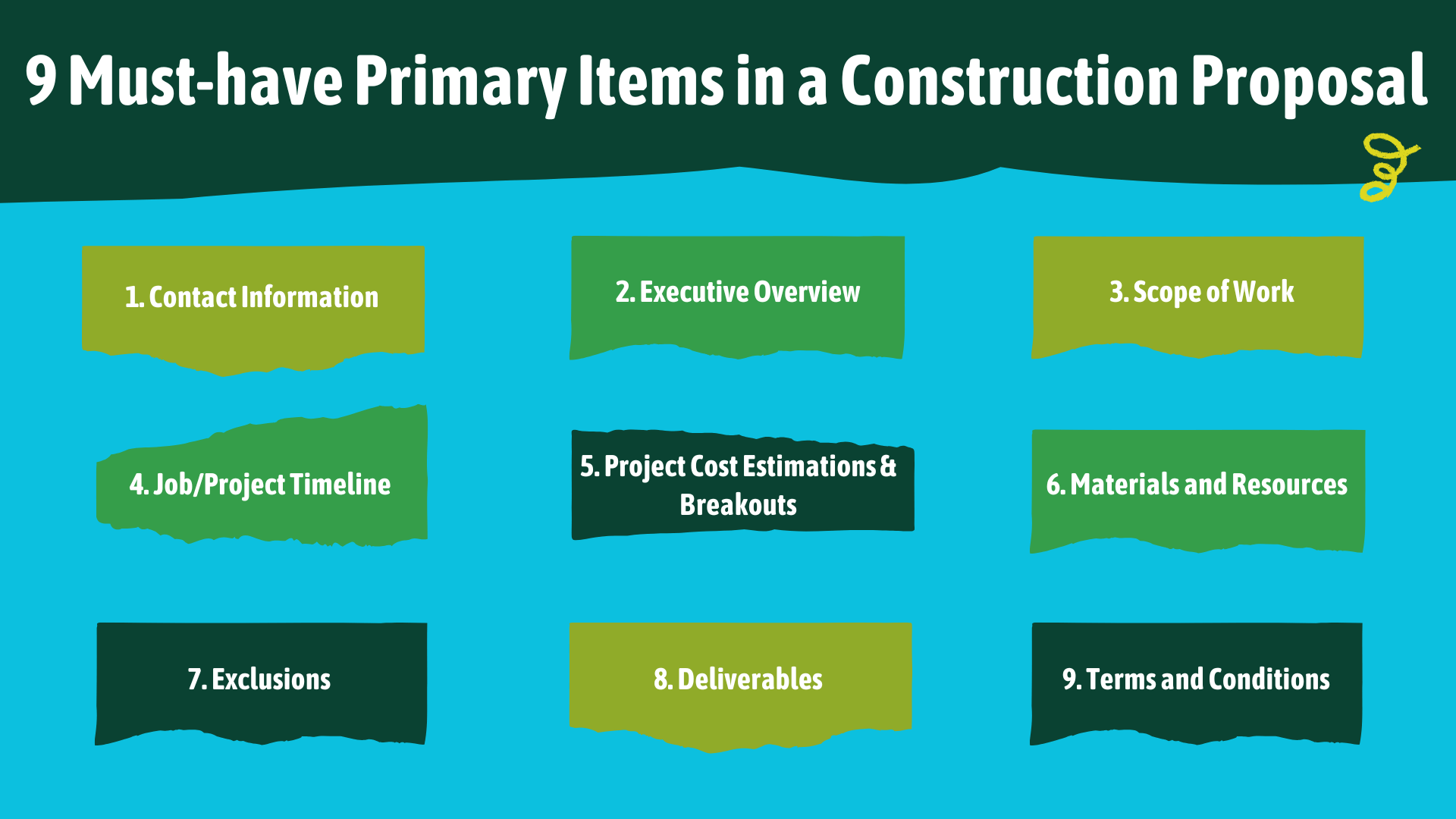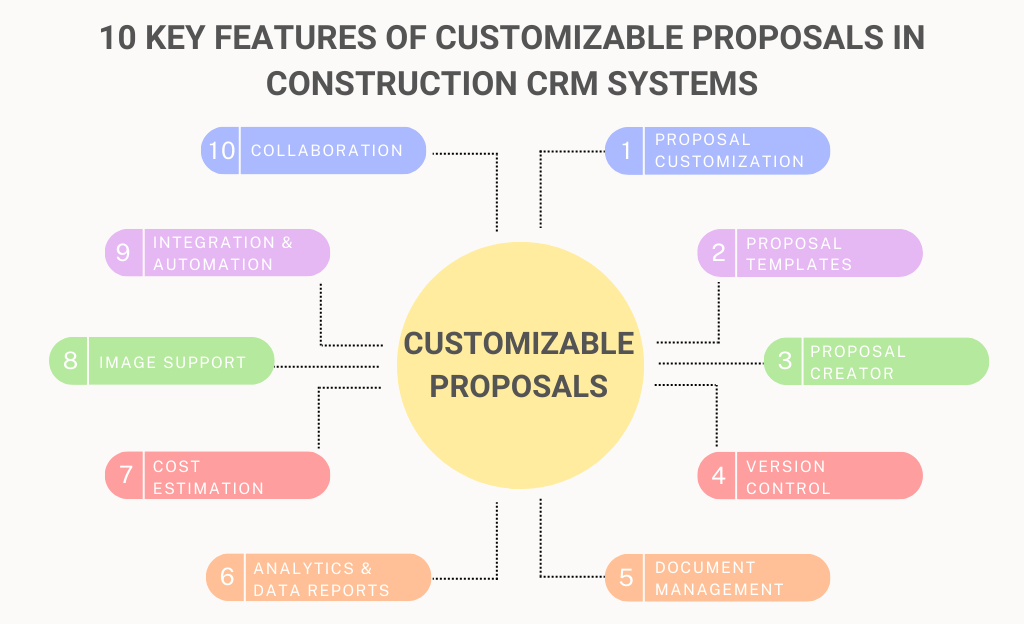Table of Contents
Different jobs may need different construction proposals. There are no one-fit-for-all construction proposals. What’s more, personalized proposals may have a more positive impact on clients as they show that the company cares about and values their clients' feelings. Many construction business owners leverage construction management software along with construction CRM solutions to create custom construction proposals.
However, many new construction companies might be confused about what construction proposals are and what information to include in them. This may lead to decreased job-winning rates.
Here, we have covered all you need to know about customizable construction proposals. For example, What are customizable proposals in construction CRM software? What is the difference between a bid and a proposal in construction CRM tools? What are the key features of customizable proposals? And more.
So, are you ready to learn more?
» What is a Construction Proposal?
In simple words, construction proposals are one type of business document that construction companies provide to clients. These construction proposals contain vital details of construction projects, such as project completion timelines, project cost estimations, the scope of work, materials and resources that will be used in the project, and other project-related information.
Recommended: What is Construction Project Management?
A good construction proposal can provide a clear understanding of project details to the clients. Additionally, they work as legal contract documents that construction businesses can rely on in case of any misunderstanding at the time of project completion and final payment.
» What is The Difference Between a Bid and a Proposal in Construction Business?

Project owners and clients generally use construction bids to compare them in case they get more than one bid for one project. Now, let’s discuss how a bid differs from a proposal in the construction business.
› A Bid in Construction Business
As mentioned above, bids are presented by construction companies and contractors to contest for the same job/project. They are more specific in terms of construction proposals so that clients and project owners can easily compare them by different determining elements, such as timeline, cost, and more. Bids help clients find the right companion that fulfills their specific project requirements.
› A Proposal in Construction Business
Construction proposals are created and used to showcase the skills and competencies of construction businesses and contractors. Using construction proposals, construction companies try to persuade the project owners that they are the right choice to work on their projects. Construction proposals typically contain more information than construction bids because their purpose is to showcase all the winning factors of the construction companies effectively.
» What are Customizable Proposals in Construction CRM Software?
Before learning what customizable proposals are, let’s have a brief understanding of construction CRM tools.
Construction CRM software solutions are cloud-hosted tools that allow construction companies and individual contractors to efficiently and effectively manage and maintain long-lasting relationships with their clients. These tools also help with other aspects like finding new leads, marketing business services, and providing customer support.
Construction CRM systems are equipped with a plethora of top-notch functionalities. One of them is customizable proposal templates. Using this functionality, construction businesses can easily create captivating personalized construction proposals in no time. Additionally, companies can create new construction proposals from scratch based on specific project requirements.
» 9 Must-have Primary Items in a Construction Proposal

Now that you know what a construction proposal is, let’s have a look at the 9 primary items that you should include and emphasize in construction proposals to make them stand out:
1. Contact Information
This is one of the most important entities in construction proposals. Every construction proposal should start with the contact information of construction companies (contractors) and clients (project owners). The information may include but is not limited to names, email IDs, office addresses, logos, contact numbers, and other related contact data.
2. Executive Overview
Executive overviews contain brief information on the entire construction proposal. They include a company intro, clients’ goals and requirements, and more. Businesses can also add their x-factors here, which may motivate potential clients to choose the company.
3. Scope of Work
Scope of work is the part where construction companies describe the comprehensive tasks and processes that they will perform and go through in order to complete the project successfully. The description of the processes should be thorough, and companies must ensure that they include each and every task and operation they will perform from the beginning to the work completion.
4. Job/Project Timeline
Add practical and realistic job timelines with detailed task schedules. Companies can even add starting and finishing dates of different phases of construction projects to be more precise. Also, don’t forget to mention probable delays in work for some reasons, such as bad weather, natural disasters, and other external facets that are inevitable.
5. Project Cost Estimations & Breakouts
A project cost estimate and breakout is another must-have item in construction proposals. It consists of an estimated overall project cost breakdown. They also showcase how and when clients have to pay contractors at the different phases of work. Below are some examples of expenditures that should be covered in project cost estimations & breakouts:
- Material Expenditures
- Labour Expenditures
- Permits Expenditures
- Equipment & Resources Expenditures
- Other Expenditures
6. Materials and Resources
Construction companies should include and specify materials, resources, and types of equipment that they will use for the project. It would be great if companies could specify quantities as well for transparency and better understanding.
7. Exclusions
If there are any tasks, operations, materials, or resources that will not be performed or provided by the original contractors (construction companies), then they should included here in Exclusions.
8. Deliverables
Construction businesses and contractors should carefully identify, specify, categorize, and mention project deliverables in this section. It is essential to add project deliverables as they showcase what clients will get at the end of the project completion.
9. Terms and Conditions
Construction companies must include clear and concise contractual and legal terms and conditions in construction proposals. Both parties, contractors and clients, must agree to these terms and conditions prior to initiating the project to avoid any misconceptions later. This section may include details such as:
- Dispute Resolutions
- Payment Conditions
- Completion Terms
- Insurance Necessities
- Termination Conditions
- Other Vital Facets
» 10 Key Features of Customizable Proposals in Construction CRM Systems

Best construction CRM software solutions provide many cool features for creating customizable proposals. Below are the 10 top features that construction businesses can use to create compelling construction proposals in no time:
1. Proposal Customization
This is one of the crucial features of construction proposals. It allows businesses to tailor proposals to meet company guidelines. Companies can also customize and personalize the content of proposals to align them with client requirements.
2. Proposal Templates
Construction CRM software has a library containing predefined customizable proposals. Users can easily explore the templates, choose a suitable construction proposal, and start adding details to them.
3. Proposal Creator
This is one of the most important features of construction CRM systems. Companies can create high-quality and professional-looking construction proposals using this feature. It enables users to create proposals using a drag-and-drop block editor.
4. Version Control
Another crucial feature of a customizable construction proposal is version control. Contractors can edit a proposal and save that edited version of the proposal. Additionally, contractors can save multiple edited versions so that they can easily go back to previous versions if needed.
5. Document Management
Construction companies can easily store proposal-oriented documents and files in a centralized, secure repository using a document management feature. They can also access these documents and files from anywhere if required.
6. Analytics & Data Reports
Construction companies can leverage analytical abilities and create data-driven reports for their services. Businesses can add these data reports in proposals and use them to showcase their excellence.
7. Cost Estimation
Cost estimation is another great calculative feature of the best construction CRM software tools. Using this feature, construction companies can get accurate cost estimations for various items like labour, material, and permits.
8. Image Support
This is one of the amazing functionalities of customized proposals. Companies can insert different types of images (building photos, employee headshots, plan blueprints, etc.) in construction proposals. Additionally, users can resize images as required.
9. Integration & Automation
Construction businesses can leverage external apps’ functionalities directly from construction CRM platforms using third-party integration support. I.e., checking Gmail inbox from inside the CRM tool. Using automation, companies can automate repetitive tasks like scheduling meetings with clients and leads.
10. Collaboration
Another useful feature of construction CRM platforms is collaboration tools. Using these amazing features, different teams and team members can easily share vital information with each other. Team managers can also communicate with team members and assign tasks to them from the construction proposal drafts. This may eliminate unnecessary waiting time for approvals and changes.
» What are The Top Benefits of Customizable Proposals?
Using customizable proposals and creating eye-catching construction proposals for different clients has many advantages. Nevertheless, some of the best benefits are mentioned below:
› Save Lots of Time
Creating construction proposals using drag-and-drop editors is easy and quick. It saves lots of time that can be utilized for other important business activities. Users can also calculate cost estimations and do other analytical operations to reduce time consumption.
› Improved Efficiency
Constantly using and re-using already created construction proposals brings consistency and reduces the time to create proposals. This will improve individual and overall team efficiency.
› Higher Accuracy
With the help of features like automation and cost estimates, human intervention is minimal, and construction businesses can create highly accurate construction proposals that are free of assumptions and miscalculations.
› Data-driven Insights
Customizable proposals offer modern reporting and analytical abilities. Using these abilities, companies can analyze the data and track the performance of construction proposals. Businesses can also create detailed reports so that they can find the areas of improvement in proposals and understand client preferences to increase the winning rate.
› Boosted Collaboration
Custom proposal tools have many amazing collaboration functionalities. Using them, teams can work on a single construction proposal simultaneously in real time. They can also share documents and chat with other team members. This will surely boost team collaboration and streamline the construction proposal creation workflow.
» Summary
There is no universal construction proposal that could fit every project. Hence, construction companies and contractors may have to create tailor-made construction proposals for different projects.
Businesses can easily create customized proposals using feature-rich construction CRM software tools. Just make sure that the proposals incorporate primary information, such as executive overview, contact information, scope of work, and more, so that clients can find every vital detail in one place.



